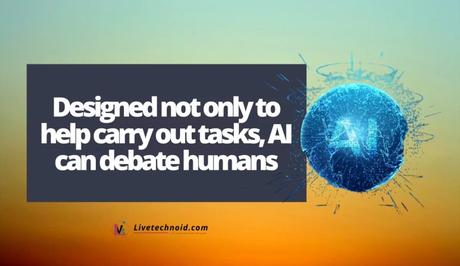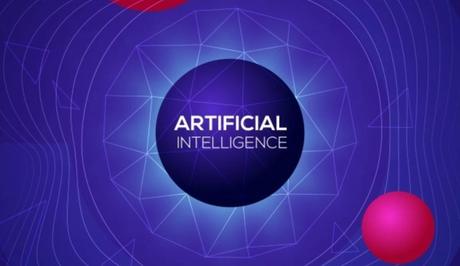It is no longer news that some tech companies like IBM are now designing machines or computers that can reason like humans. This is what probably most of us know as Artificial Intelligence.

Machines and Computers created with Artificial Intelligence are designed to help humans carry out tasks that look extremely difficult for humans. But as technology takes its tolls every day, the game is changing as machines that different firms created to help us are now more competent as they even go as far as arguing with humans. Since arguing is something humans do well, the company wants your help.
Recently, IBM has developed an artificial intelligence program that can form logical and persuasive arguments. This tech has been in development for a few years, but last year, IBM took it out to debate with real humans, and again this year, it was rolled out for Consumer Electronics Show.
As IBM calls it, ‘Project Debater – Speech by Crowd’ is a “new and experimental cloud-based AI platform for crowdsourcing decision support.” What this means is that the technology aims to understand how people feel about a specific decision.
In essence, this AI solicits arguments for and against a specific topic from as many humans as possible and then uses them to create debate speeches. The project is still a work in progress for IBM, but the company hopes to invent a system capable of engaging humans in unbiased debate.

You probably might ask, “Where does a debating robot fit into real-world applications?” Well, the answer is not far-fetched. IBM Project Debater will mainly be applied in the ever-expanding realm of customer experience. They are potentially allowing brands to gather richer feedback like customer satisfaction.
How does IBM Project Debater-Speech by Crowd work?
In this section, we will be looking at how IBM’s new tech is capable of becoming a world-class debater on any topic without bias, opinion, or any agenda. Also, we would be taking a look at one of the debates in which AI was involved.
IBM’s been putting the tech through its paces by giving people topics to debate, sourcing their arguments, and making it sputter out speeches based on that input. In a recent statement by IBM’s AI and people at CES and online people worldwide, “We should adopt vegetarianism” was addressed and turned into two distinct speeches.
The first speech, for vegetarianism, started thus:
“Hello and welcome to all. The following speech is a summary of arguments made by CES visitors and online contributors from around the world, supporting the motion We should adopt vegetarianism.
There are three issues I will elaborate on now. I will begin by claiming that vegetarians are less susceptible to disease. I will also explain that if vegetarianism is more widespread, cultures that practice it are less likely to face discrimination. And lastly, I will talk about how going vegetarian helps increase the demand for meat substitutes.”
Meanwhile, the same AI in its opposing address begins again with:
“Hello everyone. The speech you are about to hear is made of arguments disagreeing with the motion We should adopt vegetarianism, that was made by CES visitors and by online contributors from around the world.
Next, I will discuss three issues that explain why we should not adopt vegetarianism. I will start by explaining why vegetarianism is less healthy for people. Then I will show that A widespread shift to vegetarianism would have a massively negative impact on meat production. And I will also mention culture…”
Even though IBM’s tech looks like it has understood our language perfectly, IBM acknowledges that the AI hasn’t quite mastered our language yet. This leads the company to leave errors in the text intact, so the typographical errors above belong to IBM’s AI. To read or listen to the complete speeches, click here. If you could not make it out to CES to check out Project Debate – Speech by Crowd in person, you can play along online here.

Ways in which we can apply Speech by Crowd in real world
In this section, we will be looking at how IBM’s AI can be of help in the real world. The applications for Speech By Crowd are enormous. It could be used for everything from training a school debate to preparing litigators for case arguments.
Project Debater is a big step toward understanding language
Project Debater’s arguments feel a little cold and conventional. If you read or listen to the complete speeches, you’ll see the calculated, robotic logic at play. Does this ring a bell?
This leads us to conclude that we are a big step closer to robot-human understanding, making this tech a considerable milestone.
IBM’s Project Debater robot is powered by a mashup of multiple AI algorithms and principles. To start the debate, the robot is given a topic. Then it scans a database of articles and academic research, sorts through that information to find pieces of text that are both relevant and take on an argumentative tone. That is impressive, I bet!!!
Another algorithm looks for duplicate snippets and eliminates them from its collection of verbal ammunition. During the debate, a voice recognition system listens to the opponent’s argument and generates relevant counterpoints.
Project Debater can be of help in scientific research
Besides preparing litigators for case arguments, Project Debater’s most significant strength, which lies in the ability to extract facts from vast amounts of text, can also be helpful in classroom settings or as a way to address the fake news problems on social networking sites such as Facebook, Twitter and WhatsApp.
With that said, IBM has not clarified how the robot determines what information is factual and what is biased. The way that the robot currently expresses arguments still feels a bit well robotic. Noam Slonim, the principal investigator for the project, says scientific research will be the most immediate application.
Project Debater shortcomings
Project Debater seemed like a good idea when IBM announced It last year, but it is an obvious fact that humans don’t argue reasonably. Yet, we need machines that would rely on our rational thought. Such devices that will depend on rational thought and logic to debate us are doomed to play Spock to our James Tiberius Kirk for the entirety of their existence.

Crowdsourcing our opinions and combining them with AI superhuman ability to crunch data and develop patterns is extraordinary. But there is a price to pay: Either we lose to AI’s superior pattern recognition or our own appealing opinions.
Similar posts:
- Project Pioneer Review – Is This Course 100% Legitimate?
- HandyTips and Tricks for An Effective Proofreading
- How to Automate Tasks on iPhone Using Shortcuts
- Artificial Intelligence for Minimizing the use of Duplicate Images
- How to Edit Videos on Windows 10
